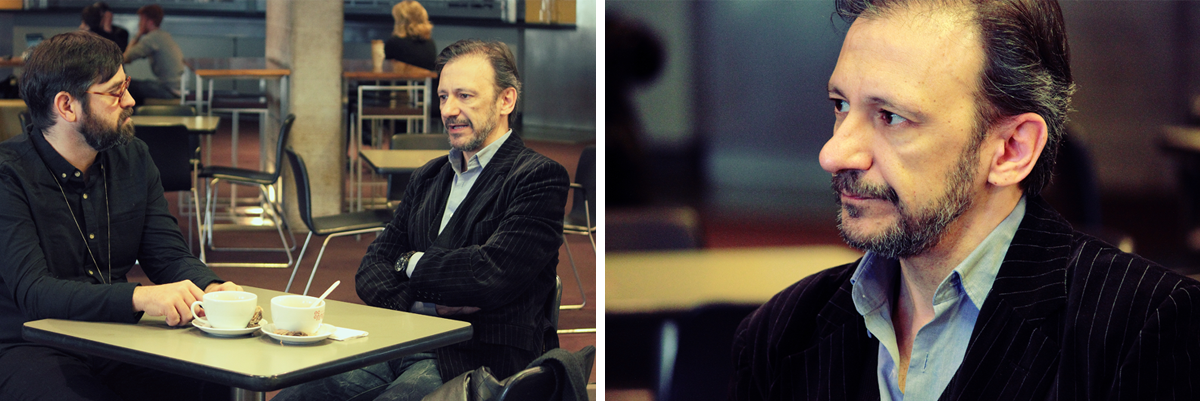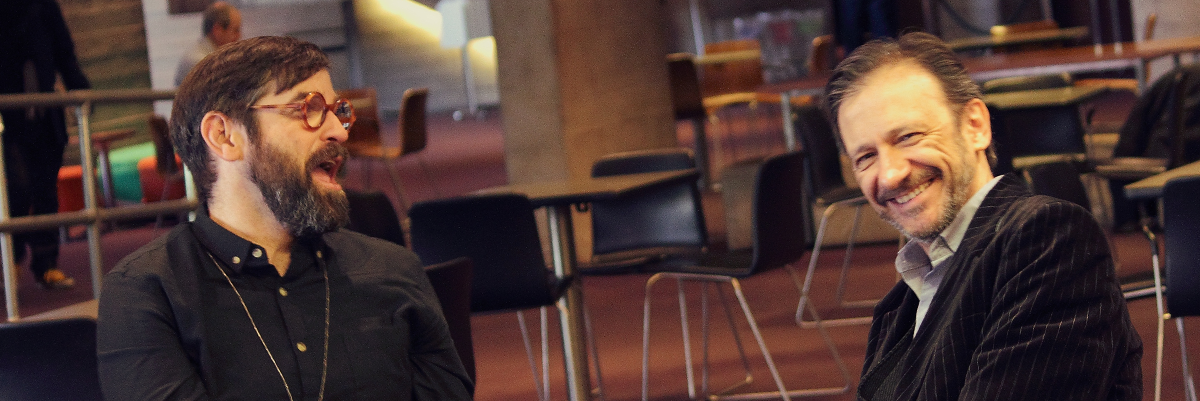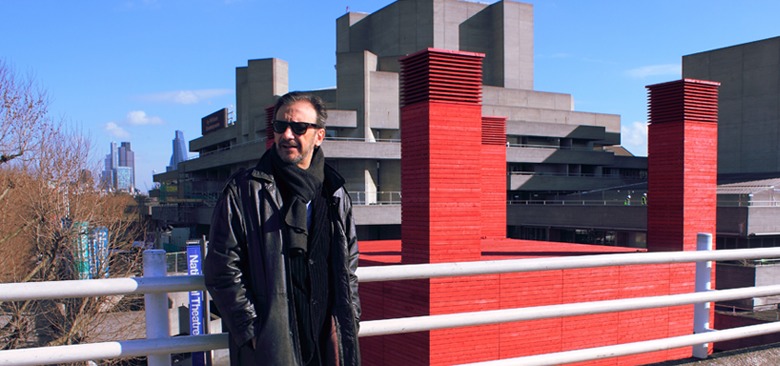On a sunny London morning in February, we meet Jorge de Juan, Spanish actor, director and producer who came to live in London just a few months ago, following a long career in Spain. He tells us that in the short space of time since he arrived, he has been to see more than fifty plays in the capital. Amongst these, of course, are a handful of Spanish classics performed at the Arcola Theatre in Hackney.
We meet in the café of the National Theatre on the Southbank, a focal point of the theatre world not just in Britain, but the world over. Jorge de Juan is in his element. We are drinking tea, as is the inescapable British way. The hour of interval drinks is still a long way off, and the café is not as buzzing as one might expect on the day of the premiere of Sam Mendes’ ‘King Lear’. No matter, in this place one lives and breathes theatre whatever the time of day. And de Juan has theatre in his blood: that’s all we need.
De Juan came to London once before, a long time ago, to study. But a Spanish director, José Luis Gómez, hired him for one of his theatrical forays to Spain, and there he stayed. ‘I’ve always had it in mind to come back,’ he says, and now, after many years of hard work away from London, he’s finally scratching that itch.
But why come back now? Why London? There are two reasons. The first is personal: de Juan’s daughter is studying in London and he wants to be near her during this important and formative period. The second is even more personal still: the founding of a Spanish theatre company here, which he has named: The Spanish Theatre Company.

“Our editor, Antonio Sierra, with Jorge de Juan at the National Theatre in London © Sabela Peinado
The aim of the company is to bring Spanish theatre to the UK. ‘It’s not just about a few Golden Age classics or a bit of Lorca,’ says de Juan, rolling his eyes slightly to emphasize the lack of imagination in the selection of authors when it comes to Spanish theatre in this country. The project will go much further than that.
De Juan, who is already in the research phase, has begun to give shape to this ambitious project. The first decision that he made was to do it in the UK and, more specifically, in London. In this regard, De Juan cites Peter Brook: ‘if the world were a city, England would be its theatre’. On top of this, we must take into account Jorge’s personal love for London. He could have opted for Edinburgh, another star city of the theatre world, with its annual fringe festival, but he had to bear in mind the future audiences that he aims to attract, and the English capital counts more Spanish speakers among its population than its Scottish cousin.
“The aim of the company is to bring Spanish theatre to the UK. ‘It’s not just about a few Golden Age classics or a bit of Lorca,’”
But the research didn’t stop there. He needed to find a venue, an actual ‘theatre’, a physical space in which to carry out all his future plans. And they are not modest plans: in addition to a theatre itself, the Spanish Theatre Company wants to offer a space dedicated to Spanish culture in all its forms, and to secure sponsorship from well-known figures in the sphere of arts and culture.
The visual arts will have a chance to shine, through exhibitions and workshops. There will also be a restaurant, which will not only serve the theatre-goers but also function as a focus for Spanish gastronomy in London. It will showcase everything from the most classic to the most innovative Spanish cuisine, and bring together Spanish and English culture through special events, an online recipe book and menus, and product and book presentations.
Over the last few months, Jorge de Juan has begun his search for the actors who will make up the company troupe. Amongst the direct contributors are a few big names on the British cultural scene, as well as one of our best-loved collaborators, Ana Inés Jabares Pita, who was recently awarded the Linbury Prize for Stage Design 2013.
Other names soon to join them are the ballerina Paula Paz, who teaches stage direction at the Central School of Speech and Drama; the actors Pablo Turégano y María Ruiz and the curator Dolores Galindo, who is currently reading a Masters in Art and Politics at Goldsmiths, and who has also collaborated on occasion with our magazine. Heading the British collaborators will be translator and author, Ed Thorpe.

Photos © Sabela Peinado
The Spanish Theatre Company has also secured the support and collaboration of the cultural manager and lawyer Almudena Adalia, and the director, producer and translator, Andy Dickinson.
At a time like this, when the economic crisis is deeply affecting Spain, and Spanish culture in all it forms, a project of this size must find funding from sources other than traditional administrative bodies, which are resolute about reducing costs and also, therefore, investments. In light of this, de Juan believes he knows the secret to realising such an ambitious project: in England, the general idea is to give back to society a proportion of the personal or economic gain you have acquired. Thanks to this mentality, a system of donations from individuals and private companies greatly facilitates the creation and maintenance of many cultural projects such as this one. ‘In the UK there are lots of patrons,’ points out De Juan, referring to one of the great and well-known advantages of the country. ‘There are lots of Spanish companies based here and I hope that they will understand how the system works, and see that supporting a project of this type will strengthen their corporate image.’
De Juan also comments that he has the backing of many official Spanish bodies, not all of which are in a position to help financially, but who will collaborate with and help promote the STC.
Next question then seems obvious: who else is on board? As an actor and director, De Juan has many years’ experience working the Spanish theatre circuit and his list of contacts must be interminable. But for him there are two influential people in the world of Spanish culture who are set to play a very important role in the project: Nacho Cano and Antonio Banderas. These two international stars are supporting the project with a view to exporting Spanish culture abroad. ‘Nacho would like to eventually transfer the idea to Miami, where he lives’, says De Juan, making clear that the famous musician and musical director not only backs the idea, but that he sees great potential in it.
Do you intend to always stage the plays in Spanish, or are you considering staging Spanish plays in English?
We will stage plays in Spanish with English subtitles, and also in English. So we will also be working with English actors, and according to the demands of each play we will sometimes have mixed casts. We want the British public to encounter Spanish playwrights choose the most appropriate option for each play.
Nacho Cano and Antonio Banderas are supporting the project because they want to see Spanish culture beyond Spanish borders.”
In the face of the ‘invincibility’ of English theatre, and leaving aside the Golden Age, Lorca, and other elements of our most international theatre, will it be a great challenge to stage new Spanish writing? Is our contemporary theatre truly that unknown in the UK? Apart from a few works by Lope de Vega, Calderón, Tirso de Molina (seen recently at the Golden Age Season at the Arcola Theatre) and of course Lorca, the rest of our playwrights are barely known. There will be an exception every now and then, in some of the smaller theatres, but even those have very short runs and are usually on for no more than a week.
What we want to do with the STC is not just stage classic plays or modern plays (by that I mean playwrights from the twentieth century onwards but who are now dead) but also our most representative contemporary theatre. It’s inconceivable that in a city as theatrical as London, writers such as Fernando Fernán Gómez, Jaridel Poncela and Buero Vallejo, to give just a few examples, are not staged; and that a success like ‘The Grönholm Method’ by Jordi Galcerán has not been staged in any West End theatre.
You have worked alongside great doyens of character interpretation like Ian McKellen and Terrence Stamp. What was that experience like? Have you perceived big differences between the way Spanish and English actors work? To work with talented actors is always and privilege and an honour. In both cases you mention, they were also very humble men who were dedicated to their passion for acting.
British actors differ from Spanish ones firstly because of their training. From the moment they set foot in drama school they set to work on Shakespeare. They value words and characterization above all else. They work more from the outside in, while in Spain, the interior is given priority over the exterior. What’s more, British actors place a lot of importance on the concept of ‘companies’, and ensemble work is very important. In the National Theatre you can see acclaimed actors doing warm ups with young actors, warm ups which you would be hard-pushed to see in Spanish companies.
Furthermore, they have a deep respect for their great playwrights, actors and directors. I have come across with many young Spanish actors who have never heard of José Mª Rodero, José Bódalo, Amparo Rivelles, Margarita Xirgú…
British actors differ from Spanish ones firstly because of their training. From the moment they set foot in drama school they set to work on Shakespeare. They value words and characterization above all else. They work more from the outside in …”
Bearing in mind the recent rise in VAT in Spain, why do you think that, unlike the British and the French, we are so neglectful of our theatre and, by extension, of everything to do with our culture? Culture in Spain, when it’s taken to mean something that belongs to us, to everyone, independent of any political agenda, died in 1936 when the war broke out. The example I always use is what was going on in the Residencia de Estudiantes (Student Residence) in Madrid between 1910 and 1936; it was the most extraordinary example of the creativity that was blooming in our country, not only on a cultural level but also social, economic, scientific and so on. The war put and end to all that.
Later when democracy arrived, there was an attempt to recuperate the lost splendour, but politics, both sides to an equal extent, has since considered culture a minor asset, and the consequences are turning out to be terrifying. It will take more than two generations, if anyone even bothers, to get back everything that was tossed into the well of oblivion.

Corporative image of the STC designed by Roberto Turégano & Rafa Prada
There is a new generation of authors, such as Juan Mayorga, Sergi Belbel, Antonio Tabares, José Padilla, Marta Buchaca, along with new alternative methods for staging plays, which are giving way to a new wave of Spanish theatre. Personally, as a spectator, I have the feeling that, despite the economic crisis, the theatres are filling up while the cinemas are emptying out. Is the theatre in better health than the cinema in our country? I’m glad you have that impression because the statistics that I’ve seen say that takings in theatres have fallen by more than 40%. And not just that, the writers you mention only get their work staged for a couple of months, if at all, at the Centro Dramático Nacional (National Drama Centre) or at the Teatro Español – if it doesn’t get privatised. The only playwright who has made it commercially is Galcerán, but the rest barely manage to get their plays put on. And let’s not even go into concerns over profitability in Madrid, or the death of touring companies.
I’m sorry to be so pessimistic, but cinemas and theatres are closing all along the Gran Vía in Madrid and are being converted into shopping centres. The big theatres built city councils (some of which were over-ambitious projects) cannot at all rely on receiving funding for their programmes and many of them are going to outsource their management. If you add to that the fact that future audience members are currently at schools that no longer teach drama, film, music, literature, art… You tell me what sort of future awaits.
What is most challenging, securing funding for a production, or success at the box office? The objective mustn’t be to achieve box office success. We have to work to restore Culture to the status it never should have lost, which is nothing less than the very heart of the people from whom it came. Culture belongs to everyone; it has no colours, no parties. It is the creative soul of our country; it is the essence of our identity as Spaniards. There should be a state pact to declare Culture an asset of primary importance. And then later we can talk about box office hits…
All of us at Brit Es Magazine wish the very best for the Spanish Theatre Company and for Jorge de Juan, and we will be at the ready to report on all its progress.
Interview by Antonio Sierra and Abel G. Santeiro.
Photographs by Sabela Peinado.
[su_note note_color=”#eaeae9″]Translated by Freya Willetts[/su_note]

